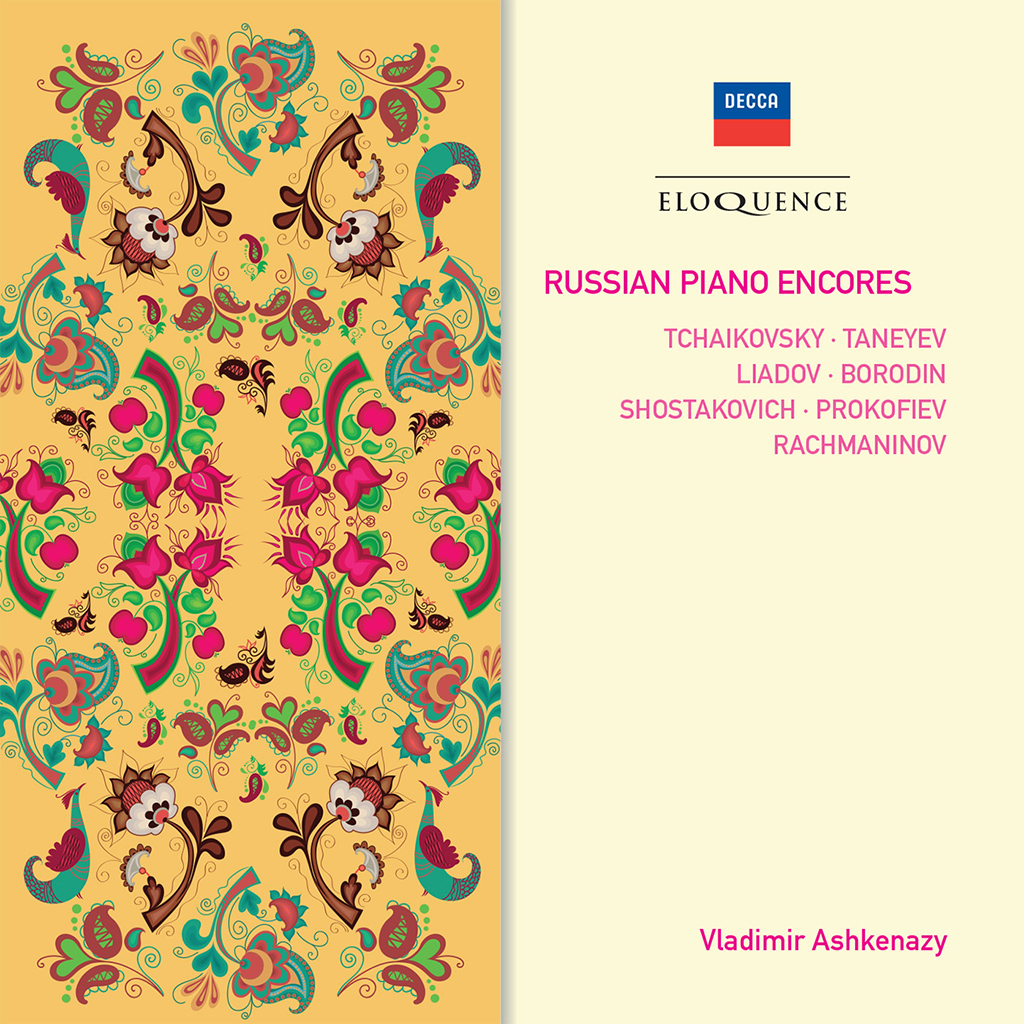Given Russia’s richness in superstar pianists, it is not surprising that Russian composers have composed extensively for the piano. Some of the composers represented in this collection were impressive pianists in their own right and they composed music designed to display their own technique and artistry. Others were more modestly gifted as performers but still composed idiomatically for the piano.
This collection brings together recordings by Vladimir Ashkenazy spanning some 40 years, from November 1963 (the three Rachmaninov ‘Études-Tableaux’) to March 2004 (the Kocsis transcription of ‘Vocalise’). Some of them appeared as fillers for bigger works – for instance, the ‘Études-Tableaux’ were coupled with the 1964 recording of Rachmaninov’s Piano Concerto No. 2 with Kyril Kondrashin, one of Ashkenazy’s earliest recording for Decca, and his first solo recording for the label. Tchaikovsky’s ‘Dumka’ and the pieces by Taneyev, Liadov and Borodin were recorded in January 1983 and issued on LP as a coupling for his digital recording of Mussorgsky’s ‘Pictures at an Exhibition’. The two pieces from Prokofiev’s ‘Romeo and Juliet’ were taped in 1968 as couplings for the composer’s Eighth Piano Sonata.
PYOTR ILYICH TCHAIKOVSKY
June: Barcarolle (from The Seasons, Op. 37b)
Dumka, Op. 59
SERGEI TANEYEV
Prelude and Fugue in G sharp minor, Op. 29
ANATOLY LIADOV
A Musical Snuff-Box, Op. 32
ALEXANDER BORODIN
Scherzo in A flat major
DMITRI SHOSTAKOVICH
Lyric Waltz (from Dances of the Dolls)
Short Piece (from The Gadfly, Op. 97)
Spanish Dance (from The Gadfly, Op. 97)
Nocturne (from The Limpid Stream, Op. 39)
Polka (from The Age of Gold, Op. 22)
SERGEI PROKOFIEV
Two Pieces for piano from Romeo and Juliet, Op. 75 (arr. Prokofiev):
Romeo and Juliet before parting
Masks
SERGEI RACHMANINOV
Prelude in C sharp minor, Op. 3 No. 2
Étude-Tableaux, Op. 39 No. 1 in C minor
Études-Tableaux, Op. 39 No. 2 in A minor
Étude-Tableaux, Op. 39 No. 5 in E flat minor
Lilacs, Op. 21 No. 5
Daisies, Op. 38 No. 3
Vocalise, Op. 34 No. 14 (arr. Kocsis)
Vladimir Ashkenazy, piano
Recording Producers: Andrew Cornall (Tchaikovsky: June, Dumka, Taneyev, Liadov, Borodin, Shostakovich, Lilacs, Daisies, Vocalise); James Walker (Rachmaninov: Prelude, Op. 3 No. 2); Erik Smith (Rachmaninov: Études-Tableaux), Ray Minshull (Prokofiev)
Balance Engineers: Philip Siney (Tchaikovsky: June, Lilacs, Daisies, Vocalise); Stanley Goodall (Tchaikovsky: Dumka, Taneyev, Liadov, Borodin); Philip Siney, Andrew Hallifax (Shostakovich); James Lock (Prokofiev); Kenneth Wilkinson, John Dunkerley (Rachmaninov: Prelude, Op. 3 No. 2); Kenneth Wilkinson (Rachmaninov: Études-Tableaux)
Recording Locations: Decca Studios, West Hampstead, London, UK, November 1963 (Rachmaninov: Études-Tableaux); Kingsway Hall, London, UK, January 1968 (Prokofiev), January 1983 (Tchaikovsky: Dumka, Taneyev, Liadov, Borodin); All Saints’ Church, Petersham, Surrey, UK, April 1975 (Rachmaninov: Prelude, Op. 3 No. 2); Teldec Studios, Berlin, Germany, December 1998 (Tchaikovsky: June), December 2000 (Lilacs, Daisies); Potton Hall, Suffolk, UK, September 2003 (Shostakovich), March 2004 (Vocalise)
‘The ‘Dumka’ is Tchaikovsky’s most successful single movement for solo piano and this fine performance is a welcome replacement to Horowitz’s more incisive one of some 40 years ago. Taneyev’s ‘Prelude and Fugue’ is academic yet lively, the Lyadov is a charming salon piece, and Borodin’s Scherzo is characteristically melodious’ Gramophone

